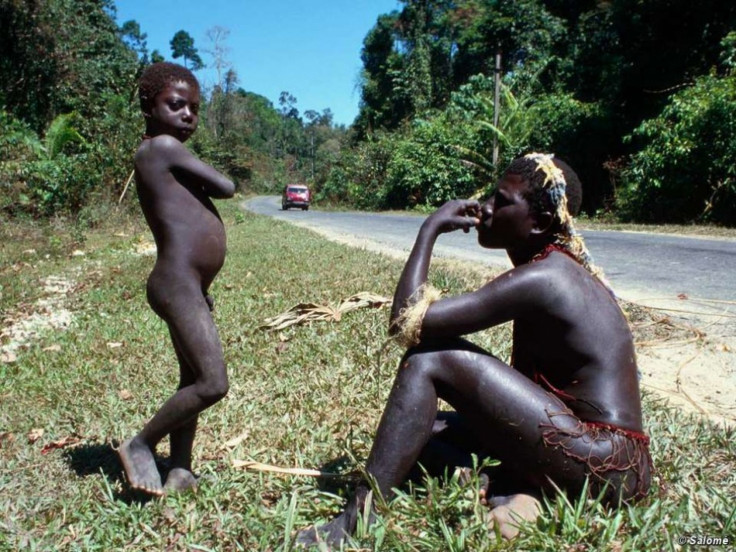‘Human Safaris’ To Andaman Islands’ Jarawa Tribe Stopped (Again) By Indian Court, But Will It Work?

India’s Supreme Court on Monday finally banned tourists from traveling along a road in the Andaman Islands that was used for so-called “human safaris.” The ruling came exactly one year after the plight of the Jarawa tribe made headlines around the world.
First exposed by tribal rights group Survival International in 2010 and brought to light by an unsettling video uploaded by British newspaper the Observer last January, dozens of visitors to the remote Andaman Islands -- located between India and Burma in the Bay of Bengal -- would queue each morning for tours costing about $18. The tours ran through a jungle reserve set aside for the Jarawa tribe. Once inside the protected forest, tour guides would then toss scraps of food to the half-naked natives, commanding them to dance for photos.
Video footage posted online of the dancing Jarawa showed the kind of exotic encounter that some tourists dream about when they venture to an exotic land, but Survival and several members of the Indian government denounced the practice as both devastating and humiliating for the tribe involved.
“It is disgraceful that something like this is happening,” Tribal Affairs Minister V. Kishore Chandra Deo stated. “It cannot be pardoned. It deserves exemplary punishment.”
The Andaman Islands are part of India, and the nation has laws designed to protect indigenous groups susceptible to outside influence. Photography or coming into contact with the disease-prone Jarawa is, by law, illegal, though a third of a million visitors are estimated to trespass on their reserve each year.
After first making contact with "civilization" in the late 1990s, the tribesmen have only recently made tentative steps toward having a relationship with the outside world. Some 400-strong, they are a nomadic people who live in bands of 40 or 50 in the thick forests of South and Middle Andaman, hunting pig and monitor lizard and fishing with bows and arrows. Short, dark-skinned and with curly hair, they resemble African Bushmen in appearance and are thought to be among the first to migrate successfully from Africa to Asia.
India’s Supreme Court ordered Andaman authorities to implement a 5-kilometer (3-mile) buffer zone last July to protect the Jarawa from exploitation; however, Andaman officials allowed two attractions -- a limestone cave and a “mud volcano” -- to remain open. Tourists who wanted to see the Jarawa could simply go on an excursion to one of these locations and interact with Jarawa by the roadside, Survival claimed.
Locals have long downplayed any tribal issues on the islands. Senior Andaman policeman Shamsher Bahadur Deol noted when the scandal broke last January that police had made over 1,000 arrests of people attempting to make contact with the Jarawa, but he added that “it’s impossible for them to catch everyone.” Indian officials and tribal advocates, meanwhile, believe the police are complicit in allowing the tours to continue.
Gethin Chamberlin, the Observer reporter who broke the story, returned to the Andaman Islands in September and said as many as 250 vehicles still traveled through the reserve, some sponsored by the local government.
At least 60 vehicles allegedly remained in operation last week when the Andaman administration once again attempted to circumvent the Supreme Court’s ruling by altering the buffer zone. Survival accused the Andaman authorities of committing a “serious and continuing contempt of court” through “flagrant breaches,” and the group appealed to the Indian Supreme Court to take action and close the Andaman Nicobar Trunk Road through the reserve once and for all.
While justices issued an interim order Monday, they will not take up the case in full until Feb. 26.
Survival Director Stephen Corry called the ruling positive, but he said “it will be meaningless if the Supreme Court allows the Andaman authorities once again to ride roughshod over its ruling.”
“It’s vital that the order is upheld and the human safaris end -- the Jarawa themselves must decide if, when and where outsiders traverse their land.”
Corry has followed the case closely and stated last year that the story of the Jarawa “reeks of colonialism and the disgusting and degrading ‘human zoos’ of the past.”
“The Jarawa are not circus ponies bound to dance at anyone's bidding," he said. “Quite clearly, some people's attitudes toward tribal people haven't moved on a jot.”
© Copyright IBTimes 2025. All rights reserved.






















